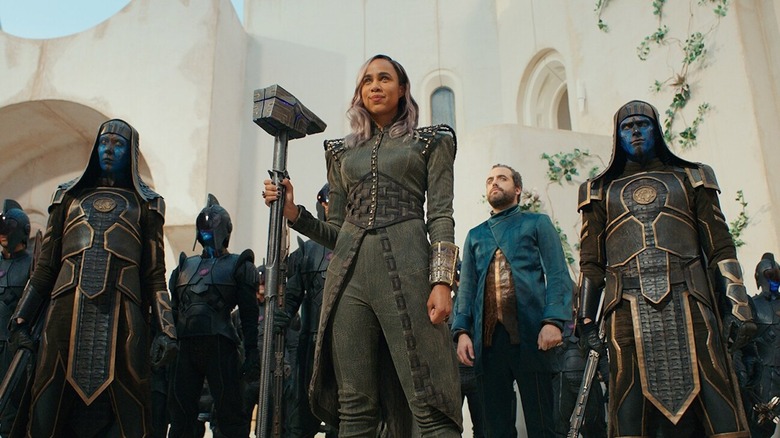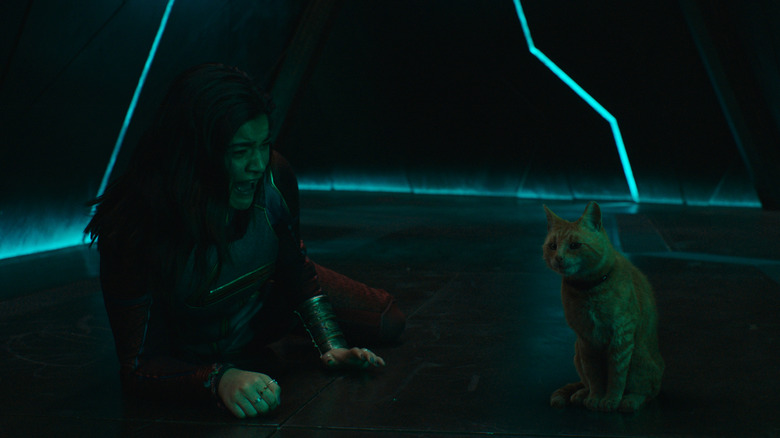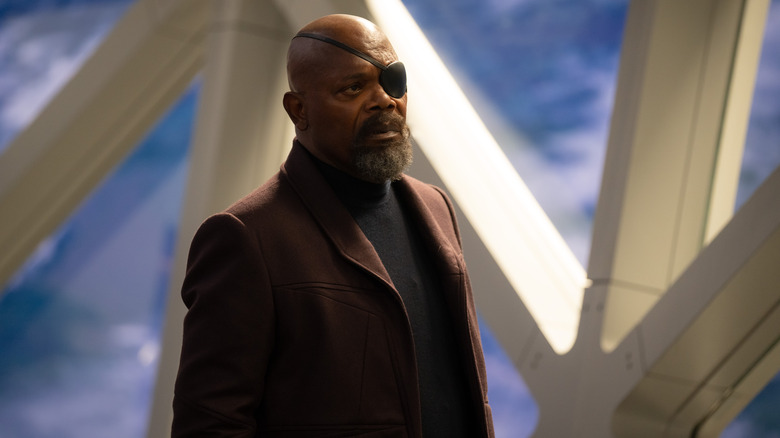Post-Endgame Marvel Finally Has A Unifying Theme, And It's Not The Multiverse
Heavy spoilers for "The Marvels" follow.
"Avengers: Endgame" remains a monumental blockbuster, one that marked the end of Marvel as we knew it and should have marked a nice and long break for the franchise.
Since "Endgame," the Marvel Cinematic Universe has been in a bit of disarray. There's no unifying plot, nor a lot that connects the movies or characters. This makes it easier for the MCU to simply ignore and forget about every single world-changing event in the new movies and shows the moment credits roll.
Sure, this is supposed to be a saga about the multiverse, a concept explored in a few of the movies and shows of Phases 4 and 5. But that hasn't unified the titles thematically — until now. With "The Marvels," it becomes clear that the MCU is united by a common theme post "Endgame "and that's the idea that you cannot save everyone. It is a theme we saw in "No Way Home," "Wakanda Forever," and now in "The Marvels."
Early in the film, Ms. Marvel and Monica Rambeau join Captain Marvel in trying to save a Skrull refugee settlement as the Kree literally steal their atmosphere. Though Kamala tries to stay behind to save as many people as possible, Carol Danvers pulls her into a spaceship before she gets killed, telling her she cannot save everyone as we see hundreds of Skrulls get killed behind them.
The cost of being a hero
The first time this theme really showed up in Phase 4 was in "Spider-Man: No Way Home," where it was the entire core of the movie and its raison d'etre. Peter Parker tries to do it all and save everyone, convincing Doctor Strange to enchant the whole world into forgetting Peter's identity for personal reasons. Then, when villains from other universes start pouring into Peter's universe, he vows to help redeem and save them from a dark fate. Of course, he fails to do it. Even though he saves the villains, he is unable to save Aunt May, and he is forced to make the entire universe forget who he is in order not to destroy it.
Immediately after, "Doctor Strange in the Multiverse of Madness" continued the trend and carried over some themes from the animated "What If?" show. Though not as direct as "No Way Home," the film still shows how Stephen Strange, across the multiverse, ends up destroying everything because he uses dark magic to try and save everyone before the darkness consumes him. His desire to do it all backfires and everyone else pays the price.
Even "Black Panther: Wakanda Forever," although not directly, touches on this theme as well. In the film, Shuri fails to save her mother from Namor, which nearly results in an all-out war between Wakanda and Takolan because she tries to save everyone. Meanwhile, the film slowly builds up a sequel where Shuri's actions still lead Namor to try and conquer the whole surface after all, while the U.S. tries to invade Wakanda.
All roads lead to Battleworld
Yes, this is pretty basic storytelling and not at all unique to Marvel or these movies. However, it still feels like a unifying theme leading Marvel nowadays, especially considering where the franchise is going next.
The current multiarc saga of the MCU is the Multiverse Saga, which is all building up to the next big Avengers event: "Secret Wars." Of course, comic fans know the original "Secret Wars" was essentially a big battle royale where various Marvel universes fight it out on a planet called Battleworld. Unsurprisingly, many variants of known characters die during the epic crossover, which completely redoes the Marvel universe.
In the movie version, it is likely we'll see characters die the same way they did in "Endgame." Having the idea that these heroes cannot save everyone, no matter how strong they are, is a poignant message to explore now. Seeing even the most optimistic and enthusiastic heroes like Peter Parker and Kamala Khan reckon with the idea that they will eventually lose and it will cost people's lives can make for fascinating character moments when the scope is expanded in the next crossover movie.


